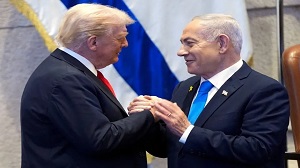Ben Rhodes Led From Behind in Life - By Jeremi Suri, Foreign Policy
The best up-close account of a modern U.S. president is also one of the most enjoyable memoirs of the 20th century: Samuel Rosenman’s Working with Roosevelt. Published in 1952, the book is Rosenman’s account of his nearly two decades, from 1928 to 1945, as Franklin D. Roosevelt’s sounding board, speechwriter, and policy advisor. Rosenman met with Roosevelt almost every morning — often in the president’s bedroom — to discuss key issues. He was a trusted alter ego for the president, frequently bucking him up to push forward with his efforts at “bold, persistent experimentation” to help the “forgotten man.”
Roosevelt used his morning discussions with Rosenman and others to think deeply about the nation’s core purposes, interests, and priorities amid the Great Depression and World War II. Rosenman describes how he and other speechwriters helped to craft the phrases — “New Deal,” “Social Security,” “Arsenal of Democracy” — that connected Roosevelt’s goals to the hopes and sufferings of ordinary citizens. His book is a conscious effort to describe how Roosevelt — and by extension, Rosenman himself — made history.
Enter Ben Rhodes, who is now, consciously or not, attempting the same feat. One of former President Barack Obama’s foreign-policy advisors, Rhodes has now written a memoir from his eight years in the White House that is clearly intended to be a lasting contribution to history. The political events the Obama administration was obliged to confront — the Great Recession of 2008, accompanied by expanding conflict in many regions of the globe — were certainly promising as raw historical material. It’s no accident that, as president-elect, Obama spent much of his transition reading about Roosevelt, consulting historians, and hiring what he believed was his own version of FDR’s famous “brain trust.” And Rhodes is clearly in a rare position to offer a clear account of what the Obama administration was like and how things got done (and didn’t get done).
But Rhodes’s book ultimately reveals his shortcomings as a policymaker — shortcomings that reflect those of the broader administration and its president. It is telling that, while the memoir will enter the historical record, it does not make its author out to be a transformative figure. And, somewhat tragically, it also diminishes Obama’s own transformative status.
Ben Rhodes would admit he was an unlikely shaper of history. He grew up in New York, not Obama’s Chicago; he was an aspiring writer, not a policy expert; and he had little political experience. He benefited from the fact that, in the run-up to the 2008 election, Hillary Clinton drew all of the top Democratic talent to her presidential campaign. Rhodes was a young man who was skilled with words and willing to work around the clock. He was idealistic, but he had few firmly articulated positions, which made him the perfect voice for Obama.
Rhodes and other young idealists were motivated to enter public service by the Sept. 11, 2001, terrorist attacks, but they were disillusioned with how establishment leaders in both parties supported a self-destructive war in Iraq and selfish economic policies that increased inequality and sunk the world economy. Rhodes channels the spirit that animated Obama’s successful campaign when he explains: “First, the people who were supposed to know better had gotten us into a moral and strategic disaster; second, you can’t change things unless you change the people making the decisions.” Millions of Americans believed the country had to change direction after President George W. Bush’s failed wars and economic policies. Obama was the antidote. “I wanted a hero,” Rhodes remembers, “someone who could make sense of what was happening around me and in some way redeem it.”
Rhodes decided Obama would be that hero, and his memoir paints a flattering portrait of the president and his team’s efforts to promote his heroic qualities. Like Rosenman with Roosevelt, Rhodes saw Obama up close, attending many of the most important policy meetings, traveling frequently with the president, and sharing quiet moments with him away from the press and other members of his administration. Rhodes recounts how hard Obama worked, often late at night, to address an endless series of domestic and international crises. He describes the president as a highly analytical, open-minded man, eager to acquire information about policy problems and hear different points of view. In Rhodes’s account, Obama reads extensively, he listens carefully, and he searches for good solutions to difficult problems.
But Rhodes has some sense that his heroic longings were not an easy match with his chosen hero’s character. Rhodes wants to measure the administration’s success by its ability to inspire the public toward idealism. At the same time, the president most often uses Rhodes to craft words that define the middle ground between extremes. When that tension reveals itself, Rhodes is apt to blame anyone but the heroic Obama — including, more often than not, himself.
U.S. policy in Afghanistan offers one of the most insightful examples of the Obama decision-making process, as seen by Rhodes in the key White House meetings. He describes how the president assembled the most informed experts, studied the issue, asked difficult questions, and struggled to find a route to stability in a country with corrupt leaders, countless foreign invaders, and a U.S. military presence that was simultaneously overcommitted and under-resourced.
Rhodes describes Obama as facing a no-win set of choices in Afghanistan, where withdrawal would look like defeat and escalation would deepen the quagmire. He argues that the president ultimately found a prudent path that improved the situation and minimized risks by increasing American forces in Afghanistan by 30,000, while demanding a focus on al Qaeda terrorists and an 18-month timetable for drawdowns to begin. Rhodes watched as the president struggled: “He’d reshaped what had come to him and turned it into something that he felt was necessary, something worthy of sacrifice, something with limits.” He then put Obama’s decision into words with the president’s speech at West Point on Dec. 1, 2009, announcing the “mini-surge” in Afghanistan.
Rhodes reveres Obama’s seriousness and his integrity but, unlike Rosenman, he expresses repeated dissatisfaction with the no-win options presented to the president: “we’d failed him.” Conventional wisdom about U.S. power and mobilized opposition from interest groups (including the military), foreign governments (especially Israel), and Republican politicians haunt Rhodes’s time in the White House. Time and again, the urge to pursue new policies in Afghanistan, the Middle East, and other regions was pared back, by necessity, because the president could not push against so many adversaries at once. Obama’s heroism, in Rhodes’s account, comes from his combined idealistic pursuit of reform, realistic recognition of limits, and pragmatic acumen in crafting various compromises and half-measures.
The compromises and half-measures avoided catastrophe (“Don’t do stupid shit”), but they frequently failed to bring substantive improvements or meet even modest expectations. This was particularly true for American policy toward the Arab-Israeli conflict and Syria during the Obama presidency, where U.S. efforts stumbled from crisis to crisis without any evidence of progress.
Rhodes honestly recounts that he felt frustrated throughout his time in the White House, and it ate away at him. He feared he was becoming a hollow man. “I wrestled with the constant concern that I was losing myself inside the experience, transformed into a cipher for the needs of this other person who, after all, was a politician, playing the role of U.S. president.” “I worried,” Rhodes continues, “that we were becoming so conservative that we were losing touch with what we had set out to do.”
These lamentations never appear in Rosenman’s recollection of his work with Roosevelt, despite the graver challenges of the Great Depression and the Second World War. That is why the historical comparison is so important. Roosevelt engaged his closest advisors in an ongoing philosophical discussion about American democracy and the role of the president in promoting it at home and abroad. He elicited new ideas for programs and endeavored to inspire experimentation throughout his administration. “New lines of thought would be stimulated,” Rosenman recounts. “It was the kind of ‘homework’ in governmental thinking which Roosevelt enjoyed, which he used a great deal in the White House, and from which he always profited.”
The speeches flowed from the philosophical discussions: the “bank holiday,” “Lend-Lease,” the “United Nations,” the “Four Freedoms,” the “GI Bill,” and many more. Rosenman helped the president generate new ideas that stretched and improved U.S. democracy. He helped to make the president a creative problem-solver and an innovative strategist. In what was also a very partisan time, the philosophical depth of Roosevelt’s table talk allowed him to sit above his critics and lead public discussions.
Obama complained that he did not have the “bandwidth.” His days were filled with too many crises at home and abroad. The rapid spread of critical opinion in a 24-hour news cycle, with instant social media, put Obama perpetually on the defensive. Unlike Rosenman, Rhodes spent most of his hours helping the president react to crises. He admits that it was nearly impossible to catch up with the news cycle, let alone find time for creative initiatives. When new ideas did find their way into speeches — including calls for nuclear disarmament and a pivot to Asia — they were frequently forgotten as the president, Rhodes, and others in the White House focused on the fires in their inboxes.
Obama acted with good judgment to manage the many crises he confronted, studiously avoiding a replay of disasters like the Iraq War, Hurricane Katrina, and the collapse of Lehman Brothers. He worked with determination to support initiatives that would advance the national interest, as he saw it, especially the killing of Osama bin Laden. And Rhodes defends the president’s courageous efforts to reach agreements with Iran and Cuba that sought to limit nuclear proliferation and open a long-isolated economy. Rhodes personally led the secret negotiations that set the stage for Obama’s dramatic visit to Havana in March 2016.
But Rhodes does not, in more than 400 pages, offer a single moment when he and the president discussed how to articulate a strategy for making sense of the broader international changes around them. They knew what they were against — perpetual war, the spread of violent regimes, a collapse of the world economy — but they did not know what they were for. Rosenman helped Roosevelt to define a hopeful vision for the New Deal. Rhodes helped Obama to manage chaos and make good decisions, but not to define the world order for a new era. Rosenman worked to make Roosevelt a world leader; Rhodes worked to make Obama a better manager of a world that continued to lack guideposts.
After eight years of sleepless nights at the center of power, Rhodes is refreshingly honest about how hard the job of president is and how relieved he and Obama were that they avoided striking out. They hit mostly “singles” and “doubles,” which look really good in 2018, with the United States throwing wild pitch after wild pitch as allies abandon Washington and adversaries acquire more advantages. Fittingly, a Secret Service agent told Rhodes at the end of the administration that he was relieved Obama completed two terms alive.
Rhodes was never part of a brain trust of big thinkers for Obama. Such a thing never existed. This was not an administration of big ideas or strategic breakthroughs, and the opposition is not the only reason why. Obama was drawn to Rhodes because they shared many qualities: seriousness, competence, and skill with words, but also a tactical focus and a preference for slow incrementalism over creative change.
Rhodes excelled in providing the words for modest ambitions. He appropriately titles his memoir The World as It Is, which the Obama administration preserved amid many catastrophic possibilities. Modest accomplishments, insufficiently appreciated, might have contributed to the current catastrophe that is President Donald Trump. For eight years, the Obama administration failed to disempower the resentful populism that Trump represents, and now he threatens to destroy the stability they so carefully preserved. The world as it is was never enough.
Latest News
-
 King meets with retired brothers-in-arms from Special Forces
King meets with retired brothers-in-arms from Special Forces
-
 Foreign Minister, Qatari prime minister discuss bilateral ties, Gaza developments
Foreign Minister, Qatari prime minister discuss bilateral ties, Gaza developments
-
 Jordan beats Egypt to reach 9 points at top of group C in Arab Cup
Jordan beats Egypt to reach 9 points at top of group C in Arab Cup
-
 Netanyahu to Meet Trump on December 29
Netanyahu to Meet Trump on December 29
-
 Hamas says no Gaza truce second phase while Israel 'continues violations'
Hamas says no Gaza truce second phase while Israel 'continues violations'